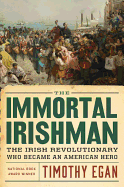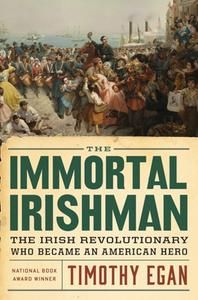
 Any new book by popular historian Timothy Egan is a cause for celebration, and The Immortal Irishman: The Irish Revolutionary Who Became an American Hero is no exception. Egan won the National Book Award for The Worst Hard Time in 2006, and more recent books such as Short Nights of the Shadow Catcher have found similar acclaim.
Any new book by popular historian Timothy Egan is a cause for celebration, and The Immortal Irishman: The Irish Revolutionary Who Became an American Hero is no exception. Egan won the National Book Award for The Worst Hard Time in 2006, and more recent books such as Short Nights of the Shadow Catcher have found similar acclaim.
Egan's eighth book, The Immortal Irishman, recounts the barely believable life of Thomas Francis Meagher, who seems to have had an almost Forrest Gump-like knack for finding himself in the midst of important historical events. Born in Ireland in 1823 to a wealthy family, Meagher became dissatisfied with his father's conciliatory attitude toward the ruling British. Egan shares a few anecdotes about the soon-to-be-hero's endearing acts of resistance, including one occasion where Meagher was deprived of the part of the Earl of Kent in his school's production of King Lear because of his thick Irish brogue. He had his revenge on opening night when, demoted to a bit part, he jumped onto the stage: "In the deepest invocation of his native Munster province, he bellowed his line: 'The British powers were marching thitherward.' The audience roared, and Thomas repeated it, in a still more exaggerated Irish accent." It's an amusing story with serious implications--as Meagher himself darkly noted, it "was not the first time the brogue entailed the forfeiture of title and estate."
As an adult in Ireland, Meagher got into more serious trouble. A skilled orator, her joined a small group of Irish nationalists composed largely of poets, writers and orators known as Young Ireland, whose outspoken members were energized by the onset of the Great Hunger. Perhaps more commonly known in the United States as the Potato Famine, the horrific consequences of the blight and British misrule led Meagher to take part in a failed uprising in 1848. Captured by the British, he was deported to the penal colony of Tasmania.
Amazingly, Meagher's journey didn't end there. He escaped from Tasmania and made his way to New York City, where he found a large Irish diaspora population as well as a country sliding toward Civil War. Thanks to Meagher's status as a revolutionary hero and his oratorical talents, he eventually led a newly formed Irish Brigade into some of the bloodiest battles of the war.
Meagher's busy life contained many more twists and turns than can be summarized here. The Immortal Irishman, thankfully, provides not just a recounting of Meagher's exploits but historical context for his adventures in Ireland, Tasmania and the U.S. Certainly his life makes for an engaging narrative, but Meagher also comes across as a decent fellow engaged in a "persistent lifelong struggle to grant dignity to those without it." In a way, Meagher's story is the story of the Irish diaspora, and The Immortal Irishman is part biography, part celebration of the unkillable Irish spirit. --Hank Stephenson, bookseller, Flyleaf Books
Shelf Talker: The near-mythic Irishman Thomas Francis Meagher became a revolutionary hero, escaped from a British penal colony and led a brigade of Irish-American soldiers through some of the bloodiest battles of the Civil War.

